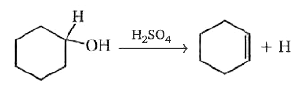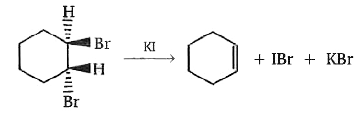Which of the following reactions is reversible?
H2(g)+I2(g)→2HI(g)
Ba(OH)2(l)+H2SO4(l)→BaSO4(s)+2H2O(l)
NaCl(l)+AgNO3(l)→AgCl(s)+NaNO3(l)
Fe(s)+S(s)→FeS(s)
The correct Answer is:A
To determine which of the given reactions is reversible, we need to analyze each reaction based on the characteristics of reversible and irreversible reactions.
1. Understand Reversible and Irreversible Reactions:
- A reversible reaction can proceed in both forward and backward directions, represented by a double arrow (⇌). This means that reactants can form products, and products can revert back to reactants.
- An irreversible reaction only proceeds in one direction, represented by a single arrow (→). This means that once the reactants form products, they cannot revert back to the original reactants.
2. Analyze the Given Reactions:
- Reaction 1: Hydrogen (H₂) + Iodine (I₂) ⇌ Hydrogen Iodide (HI)
- This reaction is reversible because both reactants (H₂ and I₂) can combine to form products (HI), and HI can decompose back into H₂ and I₂.
- Reaction 2: Barium Hydroxide (Ba(OH)₂) + Sulfuric Acid (H₂SO₄) → Barium Sulfate (BaSO₄) + Water (H₂O)
- This reaction is irreversible because it produces a precipitate (BaSO₄) and cannot revert back to the original reactants.
- Reaction 3: Sodium Chloride (NaCl) + Silver Nitrate (AgNO₃) → Silver Chloride (AgCl) + Sodium Nitrate (NaNO₃)
- This reaction is also irreversible because it produces a precipitate (AgCl) and does not revert back to the original reactants.
- Reaction 4: Iron (Fe) + Sulfur (S) → Iron Sulfide (FeS)
- This reaction is irreversible because once iron and sulfur react to form iron sulfide, they do not revert back to iron and sulfur.
3. Conclusion:
- Among the four reactions analyzed, the only reversible reaction is:
- Hydrogen + Iodine ⇌ Hydrogen Iodide
Final Answer:
The reversible reaction is Hydrogen + Iodine → Hydrogen Iodide.
---
- A reversible reaction can proceed in both forward and backward directions, represented by a double arrow (⇌). This means that reactants can form products, and products can revert back to reactants.
- An irreversible reaction only proceeds in one direction, represented by a single arrow (→). This means that once the reactants form products, they cannot revert back to the original reactants.
- Reaction 1: Hydrogen (H₂) + Iodine (I₂) ⇌ Hydrogen Iodide (HI)
- This reaction is reversible because both reactants (H₂ and I₂) can combine to form products (HI), and HI can decompose back into H₂ and I₂.
- Reaction 2: Barium Hydroxide (Ba(OH)₂) + Sulfuric Acid (H₂SO₄) → Barium Sulfate (BaSO₄) + Water (H₂O)
- This reaction is irreversible because it produces a precipitate (BaSO₄) and cannot revert back to the original reactants.
- This reaction is also irreversible because it produces a precipitate (AgCl) and does not revert back to the original reactants.
- This reaction is irreversible because once iron and sulfur react to form iron sulfide, they do not revert back to iron and sulfur.
- Among the four reactions analyzed, the only reversible reaction is:
- Hydrogen + Iodine ⇌ Hydrogen Iodide
The reversible reaction is Hydrogen + Iodine → Hydrogen Iodide.
Topper's Solved these Questions
- CHEMICAL EQUILIBRIUMBOOK - VMC MODULES ENGLISHCHAPTER - CHEMICAL EQUILIBRIUMEXERCISE - IN-CHAPTER EXERCISE - B
10 Videos
- CHEMICAL EQUILIBRIUMBOOK - VMC MODULES ENGLISHCHAPTER - CHEMICAL EQUILIBRIUMEXERCISE - IN-CHAPTER EXERCISE - C
10 Videos
- CHEMICAL EQUILIBRIUMBOOK - VMC MODULES ENGLISHCHAPTER - CHEMICAL EQUILIBRIUMEXERCISE - PRACTICE EXERCISE-4
5 Videos
- CHEMICAL BONDING-I & IIBOOK - VMC MODULES ENGLISHCHAPTER - CHEMICAL BONDING-I & IIEXERCISE - JEE Advanced (Archive)
98 Videos
- CHEMICAL KINETICS BOOK - VMC MODULES ENGLISHCHAPTER - CHEMICAL KINETICS EXERCISE - JEE Advanced (Archive)
52 Videos
Similar Questions
Knowledge Check
Which of the following reaction is an elimination reaction ?
A B
B C
C Dboth (a) and (b)
Dboth (a) and (b)
Which of the following reactions is a decomposition reaction ?
View SolutionWhich of the following reactions is not a redox reaction?
View SolutionWhich of the following gives a reversible operation ?
View SolutionWhich of the following gives a reversible operation ?
View SolutionWhich of the following is zero during reversible adiabatic expansion of the gas
View SolutionWhich of the following reactions are disproportionation reaction ?
View SolutionWhich of the following reactions is not a disproportination reaction ?
View Solution
